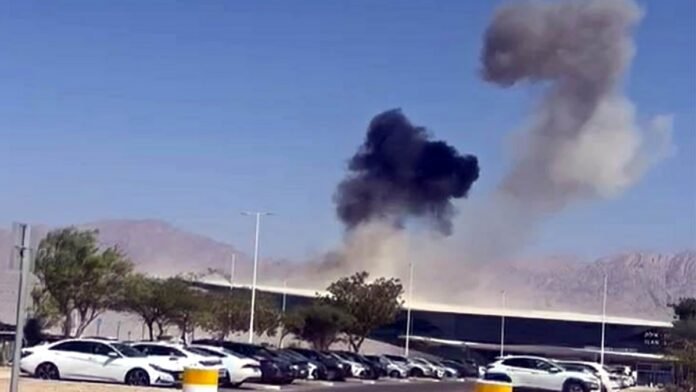
Key Points:
- Houthi drone penetrates Israeli multi-layered air defense system, striking Ramon Airport in southern Israel
- Two civilians injured and hospitalized in Eilat as airport windows shattered from drone impact
- Flight operations suspended for two hours before resuming normal service at Ramon Airport
- Israeli military admits radar detected drone but failed to accurately assess threat level
- Houthis claim responsibility as part of ongoing retaliation for Israeli operations in Gaza
New Delhi: A Houthi rebel drone successfully penetrated Israel’s sophisticated multi-layered air defense system on Sunday, striking Ramon Airport in southern Israel and raising serious questions about the country’s protective capabilities.
Drone Attack Causes Airport Disruption and Injuries
The Iranian-backed Houthi rebels launched the drone attack from Yemen, with the unmanned aircraft successfully reaching its target at Ramon Airport near Eilat. The impact shattered multiple airport windows and forced authorities to immediately suspend all flight operations as a security precaution.
Israel’s Magen David Adom emergency service reported that at least two people sustained injuries during the attack and were subsequently transported to a hospital in the nearby resort town of Eilat for medical treatment. The injuries, while not life-threatening, underscore the real-world impact of the security breach.
Two-Hour Flight Suspension Before Operations Resume
Airport authorities implemented an immediate closure of Ramon Airport’s airspace following the drone strike, halting all incoming and outgoing flights for approximately two hours. The suspension affected both commercial and private aircraft operations as security teams conducted thorough assessments of the facility and surrounding areas.
Flight operations returned to normal several hours after the initial attack, with Israeli officials confirming that the overall damage to airport infrastructure remained minimal despite the dramatic breach of security protocols. The relatively quick resumption of services suggests that while concerning, the attack did not cause extensive structural damage.
Critical Air Defense System Failure Under Investigation
The successful drone penetration has prompted urgent investigations into how Israel’s renowned multi-layered air defense system failed to intercept the threat. Israeli military officials acknowledged that their radar systems had detected the incoming drone but failed to accurately assess the threat level, preventing automated defense systems from engaging.
Notably, no warning sirens sounded before the drone impact, indicating a significant breakdown in the early warning protocols that typically alert civilians to incoming threats. This failure represents a serious gap in Israel’s defense infrastructure, particularly given the country’s reputation for advanced military technology.
The Israeli Defense Forces confirmed that investigations are currently underway to determine the specific points of failure within the defense network and why multiple layers of protection failed to neutralize the drone threat.
Houthi Military Claims Responsibility
Houthi military spokesman Yahya Sari issued an official statement claiming responsibility for the drone attack, marking another escalation in the Iran-backed group’s campaign against Israeli targets. The Houthis have consistently justified their attacks as retaliation for Israeli military operations in Gaza.
This latest attack represents part of a broader pattern of Houthi aggression, with the rebel group regularly launching long-range missiles and drones toward Israeli territory. The group’s ability to successfully strike targets within Israel demonstrates their growing technical capabilities and strategic reach.
Ongoing Regional Conflict Dynamics
The Ramon Airport attack occurs within the context of escalating tensions between Israel and Iran-backed proxy groups across the region. The Houthis have intensified their attacks on Israeli targets as part of what they characterize as solidarity with Palestinian resistance in Gaza.
Israeli officials have repeatedly emphasized their commitment to responding forcefully to such attacks, with military spokespersons confirming ongoing retaliatory strikes against Houthi positions. This cycle of attack and counter-attack has become a defining feature of regional security dynamics.
Strategic Implications for Israeli Defense
The successful penetration of Israeli airspace raises broader questions about the effectiveness of current defense strategies against evolving drone technology. Modern drones present unique challenges for traditional air defense systems, often flying at low altitudes and presenting smaller radar signatures than conventional aircraft.
The incident may prompt significant reviews of Israel’s air defense protocols, particularly regarding the integration of different defensive layers and the automation of threat response systems. Military analysts suggest that the failure highlights the need for enhanced coordination between detection and interception capabilities.
Regional Security Concerns Intensify
The attack on Ramon Airport demonstrates the Houthis’ increasing capability to project power beyond their traditional operational areas in Yemen. The successful strike suggests that Iranian support has significantly enhanced the group’s technical abilities and strategic planning capabilities.
For Israel, the breach represents both a tactical failure and a strategic warning about the evolving nature of regional threats. The incident underscores the challenges facing Israeli security planners as they work to defend against diverse threats from multiple directions simultaneously.






















































